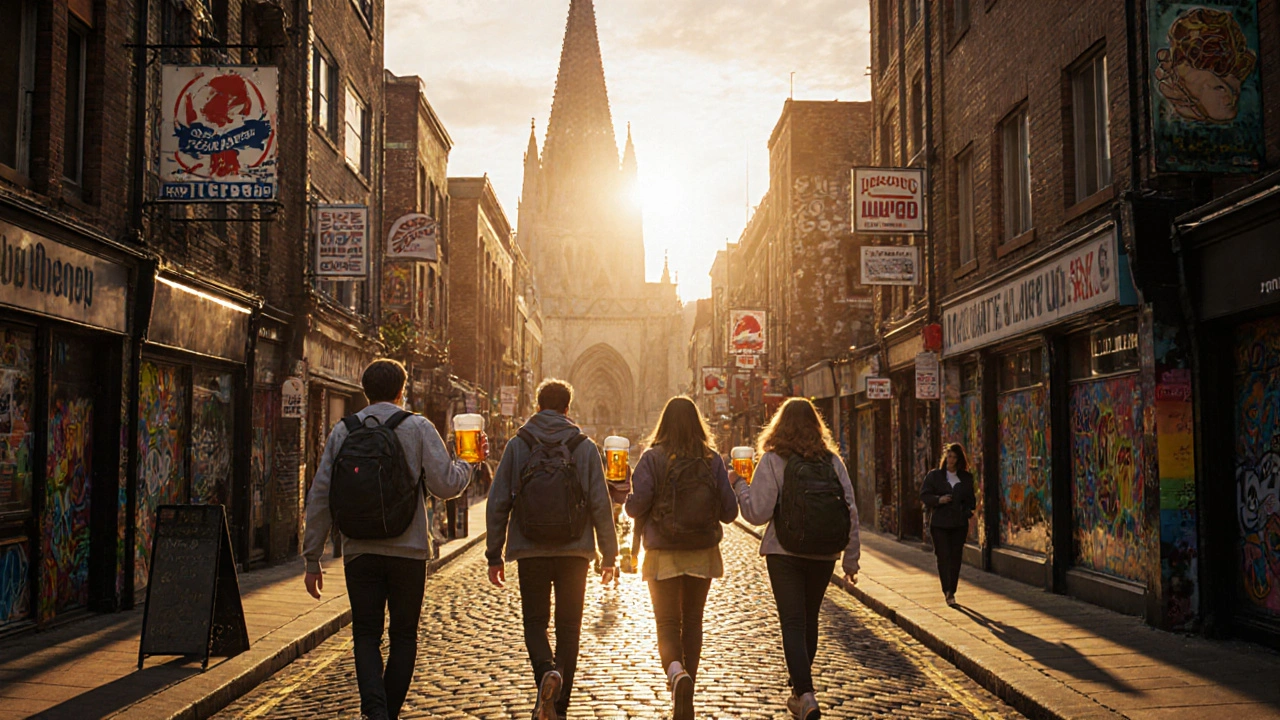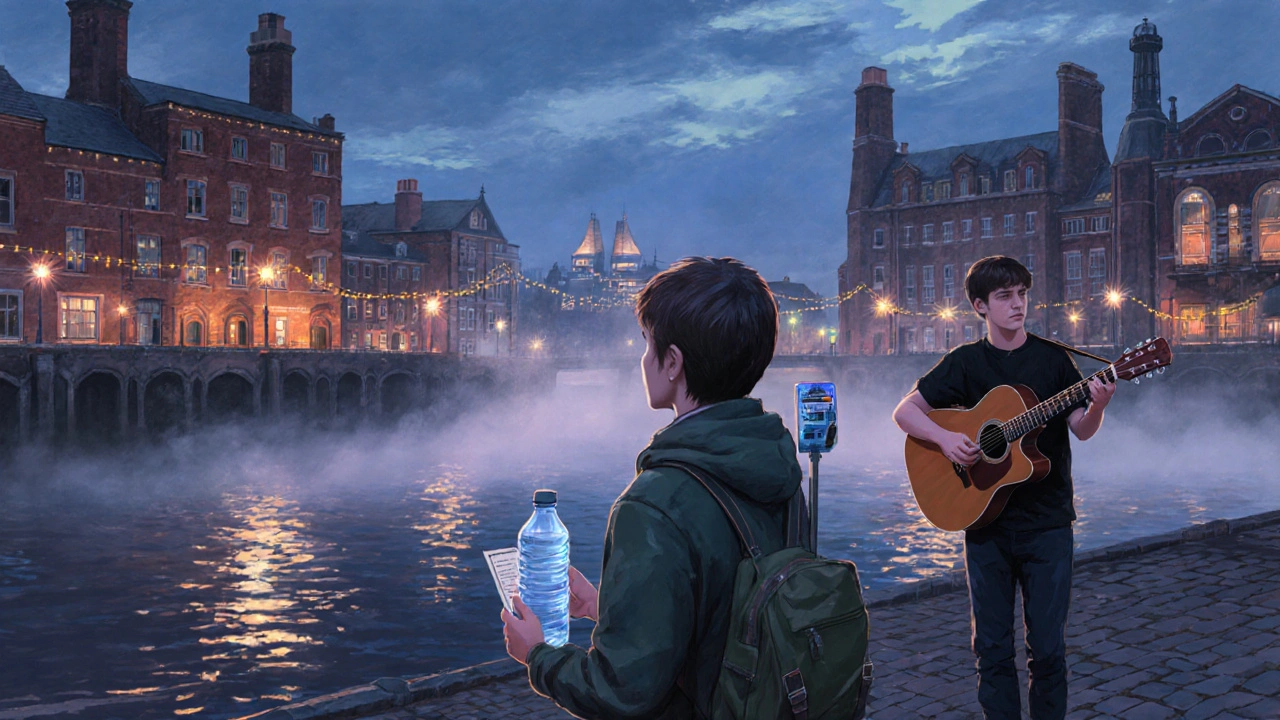
Studying in the UK doesn’t mean you have to stay stuck in your dorm all weekend. You can explore real cities, eat real food, and see real history - all without breaking the bank. Student budgets are tight, but that doesn’t mean your adventures have to be boring. Some of the best experiences in the UK cost less than a takeaway coffee.
Why Choose a City Break Over a Resort?
Resorts are expensive. Beaches in Cornwall? Great. But getting there from London costs £40+ on a train. And once you’re there, parking, food, and activities add up fast. City breaks are different. You get public transport, free museums, cheap eats, and events that are built for students. Cities like Manchester, Liverpool, and Newcastle have lower prices than London, but the same energy. You don’t need a passport to visit these places - just a student card and a backpack.
Top 5 Budget-Friendly UK Cities for Students
Here’s where you should go - ranked by value, vibe, and how much cash you’ll actually save.
1. Manchester
Manchester is the student city that doesn’t ask you to choose between culture and cheap beer. The Manchester Art Gallery is free. So is the People’s History Museum, which tells the story of workers’ rights in Britain. Walk through Northern Quarter and you’ll find vintage shops, street art, and £3 pints at places like The Hairy Dog. Catch a gig at Band on the Wall for under £10 if you’re lucky. And yes, the Manchester Cathedral is free to enter - and it’s stunning at sunset.
2. Liverpool
Home of The Beatles, but also home to free museums that feel like time machines. The Liverpool Museum is free and packed with local history - from the docks to the music scene. The Walker Art Gallery has Van Goghs and Monets, no ticket needed. Walk the waterfront, snap pics at the Royal Albert Dock, and grab a £2.50 pie from a local bakery. The Beatles Story costs £17, but you don’t need it. Just listen to the street musicians near the Pier Head - they play the classics for tips.
3. Newcastle
Newcastle is the city that never sleeps - and never charges you to enjoy it. The Castle Keep is free on Sundays. The Great North Museum has Egyptian mummies, dinosaur bones, and interactive science exhibits - all free. Walk along the River Tyne, cross the iconic Gateshead Millennium Bridge, and end the night in the Quayside area where £3.50 pints are normal. If you’re into live music, check out The Cluny - bands play here before they blow up.
4. Bristol
Bristol is the UK’s most colorful city. Street art by Banksy? You’ll find it here - and it’s all outdoors, so no entry fee. The Bristol Museum & Art Gallery is free and has a real dinosaur skeleton. Take the free ferry across the Avon Gorge to see the Clifton Suspension Bridge from below. Grab a vegan burger at The Vegan Kitchen for £6.50. And if you’re there on a Saturday, the St Nicholas Market has £1 dumplings and handmade jewelry.
5. Leeds
Leeds is quiet until 5 p.m. Then it explodes. The Leeds City Museum is free and has a Roman gallery, a Victorian dollhouse, and a live butterfly exhibit. The Henry Moore Institute has world-class sculptures - no charge. Walk through the Kirkgate Market and find a £2 sausage roll. The Leeds Corn Exchange is a beautiful old building with indie shops and coffee stalls. And yes, the Leeds Art Gallery has a whole floor of modern British art - and it’s free.
How to Save Money on Transport
Trains in the UK are expensive - unless you know how to hack them. Here’s how:
- Use Student Railcard - 1/3 off train fares. Costs £30 for a year. If you take two round trips, you’ve already saved your money back.
- Book in advance. Even a £10 ticket from Manchester to Liverpool can drop to £4 if you buy it a week ahead.
- Use megabus or FlixBus. They go between major cities for as low as £5 one-way.
- Share rides with friends. Splitting a £20 Uber from Leeds to York cuts your cost to £5.
- Walk or use city bikes. Most student cities have free or cheap bike rentals. Leeds has Nextbike - £1 for 30 minutes.
Free Things to Do in Every City
You don’t need to spend money to have a great time. Here’s what’s always free:
- Museums and galleries - almost all major ones in UK cities are free to enter.
- Parks - Hyde Park in London? Too crowded. Try Heaton Park in Manchester or Victoria Park in Leeds. Pack a sandwich, sit under a tree, and read a book.
- University campuses - Many universities open their libraries, chapels, and gardens to the public. Cambridge’s King’s College Chapel has free entry on certain days. Check their websites.
- Street markets - From Bristol’s St Nicholas to Glasgow’s Barras, these are full of cheap food, secondhand clothes, and local art.
- Free walking tours - Companies like Free Tours by Foot offer guided walks for tips. You pay what you think it’s worth - often £5 or less.

Where to Eat Without Spending More Than £10
Food is where students blow their budget. Here’s how to eat well for cheap:
- Supermarkets: Tesco, Sainsbury’s, and Aldi have ready meals for £2.50. Buy a sandwich, fruit, and a drink - total under £5.
- Student nights: Many pubs and bars offer £3 burgers or £1 pizza slices on Tuesdays. Ask around - it’s not always advertised.
- Food trucks: Look for them near universities. A kebab or vegan wrap costs £4-6.
- Local bakeries: In Newcastle, try Walls Bakery - £1.20 for a sausage roll. In Liverpool, John’s Bakery has £1.50 pasties.
- Share meals: Order one large pizza and split it with two friends. That’s £4 per person.
When to Go for the Best Deals
Timing matters. You’ll pay less if you avoid these times:
- Don’t go during university holidays - prices spike when students travel.
- Avoid bank holidays - trains and buses fill up, prices rise.
- Go midweek - Tuesday and Wednesday are cheapest for trains and hotels.
- Book hostels or Airbnbs 2-3 weeks ahead. You’ll often find last-minute deals under £20/night.
- Visit in October or January - fewer tourists, lower prices, and city events like student festivals.
What to Pack for a Budget City Break
You don’t need much. Just these:
- Student ID card - unlocks free entry and discounts everywhere.
- Reusable water bottle - tap water in the UK is safe. Save £1.50 every time you skip a bottle.
- Power bank - your phone is your map, ticket, and camera.
- Lightweight jacket - British weather changes fast. A £10 waterproof jacket from Decathlon works fine.
- Snacks - nuts, granola bars, fruit. Avoid buying £4 chocolate bars in tourist zones.

What Not to Do
Don’t make these mistakes:
- Don’t buy tickets to every museum - pick 1-2 and skip the rest. You’ll still see more than most tourists.
- Don’t use cash machines abroad - UK ATMs charge fees if you use non-UK cards. Use your debit card at bank ATMs only.
- Don’t take Ubers - use public transport or walk. You’ll see more and spend less.
- Don’t eat in tourist traps - if the menu has pictures and says "English Breakfast," walk away.
Real Student Story: A £60 Weekend in Leeds
Emma, 20, studied in Sheffield. She took a £12 train to Leeds on a Friday night. Stayed at a hostel for £18. Ate: two sausage rolls (£2.40), a pizza slice (£2), and a sandwich from Tesco (£3). Went to the museum, walked the market, saw free street music. Bought a £5 vintage jacket. Total spent: £60.50. She said: "I saw more in 48 hours than I did in my whole first year at university. And I didn’t ask my parents for money."
Can I really travel around the UK as a student without a car?
Yes, absolutely. The UK has one of the best public transport networks in Europe. Trains, buses, and even bike-sharing systems connect almost every city. Student Railcards cut train prices by 1/3, and companies like Megabus offer £5 fares between major cities. Walking and local buses are often free or under £2. You don’t need a car - you just need a good map app and a student card.
Are museums really free in the UK?
Most major national and city museums are free to enter. That includes the British Museum in London, the Manchester Art Gallery, the National Museum of Scotland in Edinburgh, and the Walker Art Gallery in Liverpool. Some special exhibitions might charge, but the permanent collections are always free. Always check the museum’s website before you go - they’ll say clearly if there’s a fee.
What’s the cheapest way to book a hostel in the UK?
Book directly through the hostel’s website, not through third-party sites like Booking.com. Hostels often offer better rates if you book early and pay upfront. Look for hostels with kitchen access - you can save £10+ per day by cooking your own meals. YHA hostels and Independent Hostels UK are reliable and student-friendly. Prices start at £15/night in most cities.
Is it safe to travel alone as a student in UK cities?
Yes, UK cities are generally very safe for solo travelers, especially during the day and early evening. Stick to well-lit areas at night, avoid empty streets after midnight, and keep your phone charged. Most student cities have active nightlife and plenty of people around. Use apps like Citymapper for real-time safety alerts and public transport updates. Trust your gut - if a place feels off, leave.
How much should I budget for a 3-day student city break?
You can do it for under £100 if you’re smart. Train fare: £20-30. Hostel: £20-30. Food: £20-25. Free activities: £0. Extras like a coffee or souvenir: £10-15. That’s £85-100 total. Skip the fancy restaurants, use student discounts, and walk everywhere. Most students spend £120-150 - you can do better.
Next Steps: Plan Your First Trip
Start small. Pick one city. Pick one weekend. Book your train ticket on a Tuesday. Find a hostel under £20. Make a list of three free things you want to do. Pack your student card. And go. You don’t need permission. You don’t need a lot of money. You just need to show up.